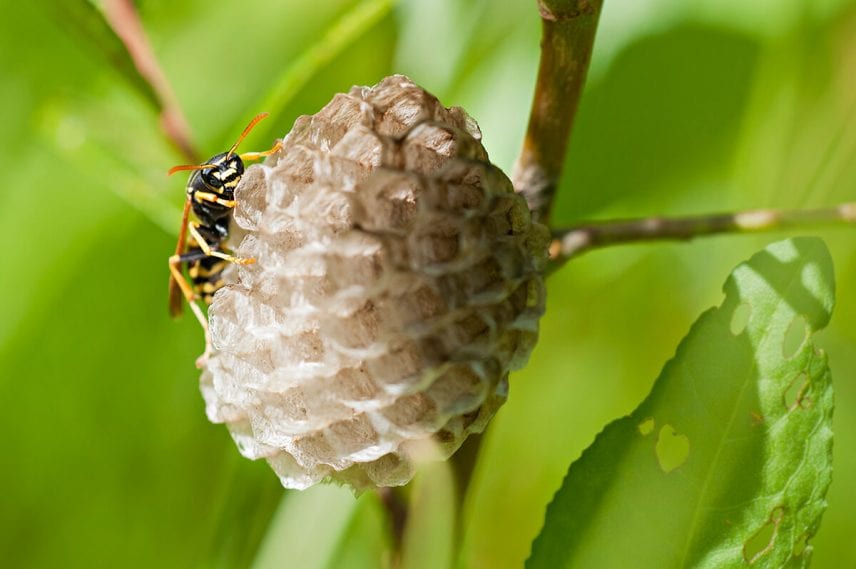Stinging insects are among the most common and dreaded types of pest. They can make outdoor areas around your home unsafe while putting your family at risk for potentially harmful allergic reactions. Wasps are one of the most dangerous of all the stinging insects. If you suspect a wasp nest on or near your property, avoid the risks of attempting to deal with it on your own. Call in our pest professionals. At Pointe Pest Control, we can safely and effectively eliminate any wasp nests that have taken root around your home, protecting your family and preventing these pests from returning in the future.
The Problem With Wasps
There are thousands of species of bees, wasps, and other types of stinging insects found throughout the New Jersey, Pennsylvania, and Delaware areas. All are often lumped into the same category by those unfamiliar with them. While they can all create nests which are a dangerous nuisance around your home, there are some key differences between them you need to be aware of.
The New Jersey Beekeepers Organization advises that bees are valuable to humans as they are busy pollinators who contribute to the growth of up to 80 percent of our crops. Wasps are pollinators as well but take a more passive approach. As a result, they are not as highly valued and are not used in commercial crop pollination. Even if they were as productive as bees, the fact that they are aggressive stingers makes them too dangerous to work with.
Bees have a barbed stinger connected to their abdomens. Once they sting an individual, the stinger is impossible to pull out without taking part in the abdomen with it. Bees can only sting once before dying and tend to only attack if threatened.
Wasps, on the other hand, are far more aggressive. The wasp’s stinger is located in the rear of its body and is not barbed. This means they can sting you numerous times. The poison contained within a wasp sting is also more likely to cause a serious reaction. Different types of wasps known to be dangerous include:
- Northern Paper Wasps;
- Mud Wasps;
- Ground Digger Wasps, also known as Cicada Killers;
- Yellow Jackets;
- Bald Faced Hornets.
Signs Of A Wasp Nest
While there are several different types of wasps, their nests are often similar. With the exception of mud daubers, who build small, tubular nests made of mud or clay, wasps typically construct nests out of chewed wood. The walls of the nest have a papery appearance and can grow quite large in size.
Wasps nests are often found in garages or sheds and under the eaves surrounding your home or porch. They can also be found in wooden birdhouses, along rooftops, and in old tree stumps or on branches surrounding your property. While wasps tend to die off over the winter months, the queen remains behind in some cases and will repopulate the nest in the spring. This means the same wasp nest can be reused over and over, growing larger each time.
You may actually see the wasp nest when outside or when performing spring cleaning and other household tasks or the nest may be less obvious. Signs to look for that indicate a wasp nest on your property include:
- An increase of wasps in outdoor areas;
- Swarms of wasps around certain locations;
- Buzzing noises coming from trees, rooftops, or other areas.
You can often estimate where a wasp nest is located by watching the wasp’s flight pattern. Wasps tend not to fly at night, so the best time to look is during the day when they are busy gathering food and materials for the nest.
What Should You Do If You Find A Wasp Nest?
If you think you may have located a wasps nest, do not approach it yourself. Wasps will attack and can sting you multiple times. In some cases, this can cause severe and dangerous reactions. Healthline warns that even for people with no known allergies, getting stung repeatedly can put you at risk of going into anaphylaxis, which is a state of shock which can have potentially life-threatening consequences. To protect yourself, avoid the area where the nest is likely located and call in our pest professionals.
Contact Pointe Pest Control Today
At Pointe Pest Control, we can help you reclaim property from wasps, eliminating the nest quickly, safely, and effectively. If you suspect a problem, contact our pest control specialists today and request a free consultation.


